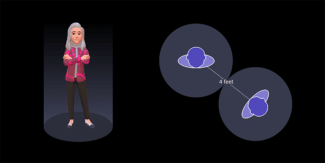Meta is rolling out a personal boundary as the default behavior in Horizon Worlds and Horizon Venues.
Horizon Worlds is Meta’s interconnected set of virtual worlds for people to visit together, akin to something like Rec Room, VRChat, or Altspace. Meta Platforms CEO Mark Zuckerberg made clear this week he expects a version of the system for traditional smartphones in 2022.
 Meta’s Horizon Vice President Vivek Sharma posting on Meta’s Oculus blog writes:
Meta’s Horizon Vice President Vivek Sharma posting on Meta’s Oculus blog writes:
If someone tries to enter your Personal Boundary, the system will halt their forward movement as they reach the boundary. You won’t feel it—there is no haptic feedback. This builds upon our existing hand harassment measures that were already in place, where an avatar’s hands would disappear if they encroached upon someone’s personal space.
We are intentionally rolling out Personal Boundary as always on, by default, because we think this will help to set behavioral norms—and that’s important for a relatively new medium like VR. In the future, we’ll explore the possibility of adding in new controls and UI changes, like letting people customize the size of their Personal Boundary.
Note that because Personal Boundary is the default experience, you’ll need to extend your arms to be able to high-five or fist bump other people’s avatars in Horizon Worlds or in Horizon Venues.
Similar settings have been put in place in various other virtual world networks over the years to maintain personal space and curb harassment. Certain uses of VR, though, like interactive theater, may advise turning off safety features in some experiences.
Meta’s Horizon Home is expected to offer a new starting place for some of the social features tested across various layers at Facebook over the years, with Worlds representing locations to visit and things to do with others in a range of virtual locales with different environments, physics and rules inside each.
We’ll be curious to see how the platform evolves over the course of the year and what happens in 2023 and beyond.





